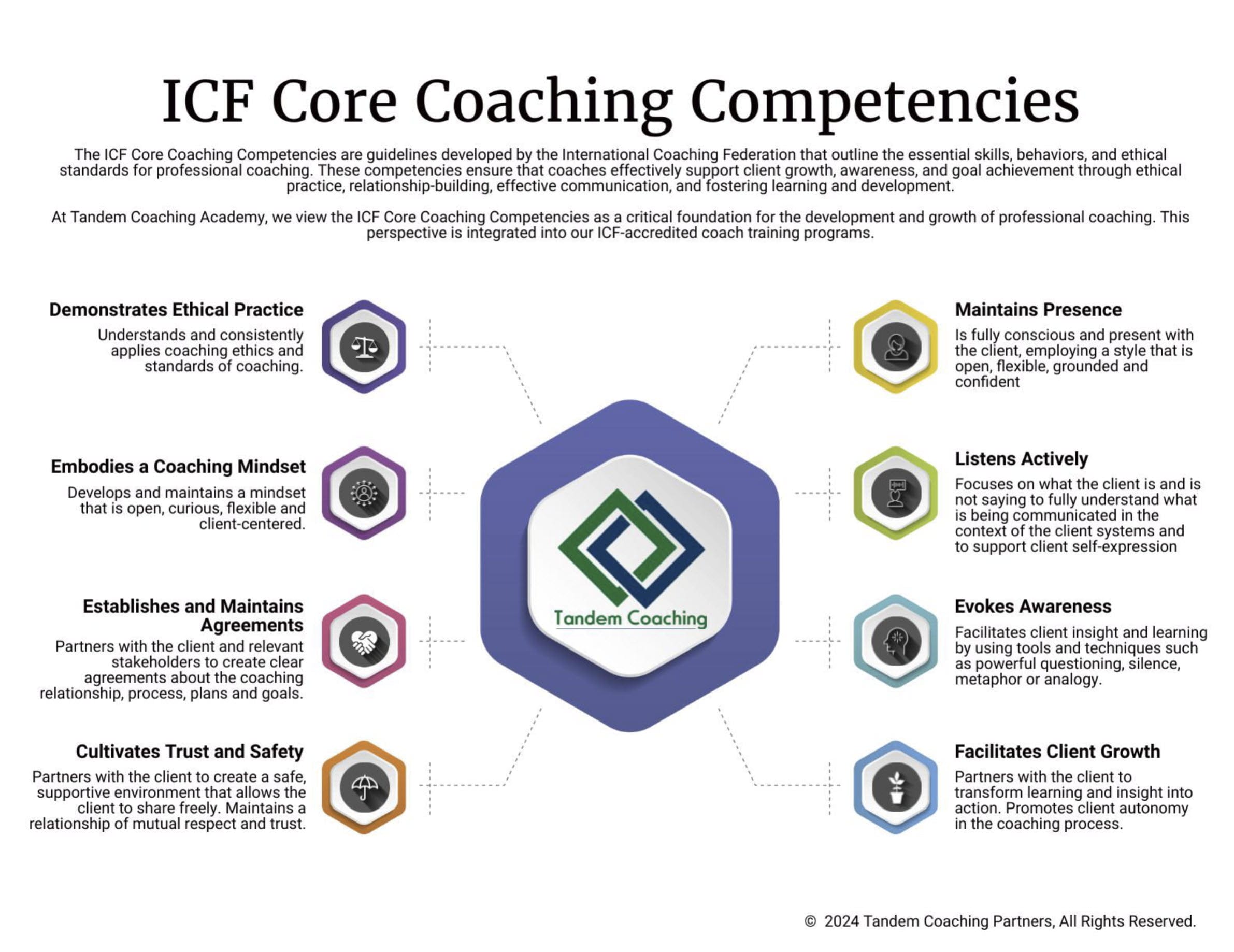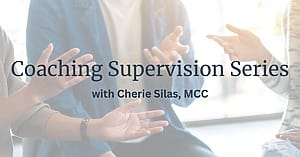TL;DR – ICF Certification Requirements
To become an ICF-certified coach, you must meet several rigorous requirements to ensure the highest professional coaching standards. These ICF certification requirements include coach-specific education, coaching experience, mentor coaching, a performance evaluation, and passing the ICF credentialing exam.
Each of these elements is integral to developing the skills and expertise necessary to deliver exceptional coaching services.
We will further detail these requirements in the “ICF Certification Requirements Explained” section below.

What is an ICF Credential?
An ICF credential is a certification that grants you credibility as a coach.
It signifies that you have completed all the above-mentioned ICF Certification Requirements, i.e., coach-specific education, coaching experience, mentor coaching, performance evaluation, and the ICF credentialing exam.
The ICF offers three levels of certification (or ‘credentials’):
Associate Certified Coach (ACC) Credential
Professional Certified Coach (PCC) Credential
Master Certified Coach (MCC) Credential
These credentials reflect varying degrees of experience and education in the coaching profession, with each level requiring progressively more extensive training and practice hours.

Understanding the ICF Certification Journey: What it Takes to Become a Coach
Embarking on the journey to become an ICF certified coach is an exhilarating path that promises not only professional growth but also a deep personal transformation. Credentials and standards- International Coach Federation arm, sets the gold standard of professional coaching, ensuring that coaching practitioners who earn their certifications are recognized globally for their skills, ethics, and commitment to continuous development. Whether you’re dreaming of becoming a life coach, an executive coach, a certified leadership coach, or a career coach, understanding the ICF certification requirements is your first step towards a fulfilling coaching career.
Benefits of ICF Certification – The Gold Standard of Professional Coaching
The ICF certification bestows upon coaches a mark of excellence that is recognized worldwide, assuring clients and the coaching profession of their commitment to ethical practices, ongoing professional development, and consistent delivery of high-quality coaching services. ICF-certified coaches have undergone rigorous education and training programs, including comprehensive executive coaching programs that imbue them with the ability to apply coaching as an effective leadership style.
Through the certification process, coaches who choose particular specialization, might learn leadership and executive coaching at a profound level, enabling them to facilitate transformative experiences for their clients. This dedication not only elevates their own practice but also contributes to the collective reputation and integrity of the coaching profession as a whole. The benefits of ICF certification are manifold, spanning increased trust from clients to better marketability and access to exclusive resources and global coaching communities. For aspiring coaches, the pursuit of an ICF credential is a pursuit of excellence, a commitment to the highest standards, and a gateway to the forefront of professional coaching.
The Importance of Choosing the Right ICF Coaching Certification Programs
Selecting the right ICF-accredited coach training program is a pivotal decision in anyone’s certification journey who want to call themselves a coach. Programs like those offered by Tandem Coaching Academy for ICF Associate Certified Coach and ICF Professional Certified Coach certifications not only guide you through the ICF certification requirements but also enrich your coaching toolkit with innovative techniques and real-world applications. Opting for a program that upholds the ICF definition of coaching, aligns with your coaching aspirations, learning style, and career goals is crucial. Tandem Coaching Academy’s programs are all-inclusive, covering every aspect of training, mentorship, and practice sessions, ensuring a seamless and supportive learning experience.
Gaining Insight on the Sophistication of Today’s Coaching Consumer
Today’s coaching consumers are more informed and discerning than ever before. They seek coaches who are not only certified and experienced but also specialized and continuously evolving. Understanding this sophistication is crucial in tailoring your approach to meet their expectations.
Coaches must be adept at communicating their value proposition, demonstrating their commitment to professional development, and showcasing their ability to address complex and varied client needs. Engaging in lifelong learning and seeking advanced certifications are key strategies in appealing to today’s coaching consumers, ensuring you can provide the depth and breadth of service that sets you apart in a competitive market.
Navigating your path to ICF certification with an understanding of the different program options, and committing to continuous education and specialization, are essential steps in building a successful and sustainable coaching practice. By staying informed, flexible, and focused on your development, you can rise to meet the needs of today’s sophisticated coaching clients and thrive in the dynamic coaching industry.
ICF credential is a professional certification that distinguishes coaches, signaling to clients and the coaching profession that they are committed to the highest standards of the coaching profession as a whole. Our sincere hope that having read this article you have a better understanding of the benefits of ICF credentials and are way on the way to becoming the next ICF Certified Coach. And if you decide to include Tandem as your journey partner – we will only be glad and grateful.

ACTP vs. ACSTH Programs – Level 1-3
Starting in 2022, the ICF has implemented an updated structure and terminology for the different paths to ICF accreditation, retiring the old terms in 2023.
- The path formerly known as ACSTH is now called Level 1, which leads to an ACC Credential.
- The path previously referred to as ACTP is now termed Level 2, resulting in a PCC Credential.
- Additionally, a new Level 3 has been introduced, serving as the pathway to an MCC Credential.
To learn more about these programs, please refer to ICF’s updated credential paths.


The Core of ICF Coaching Certification: ACC, PCC, and MCC Explained
The ICF offers three levels of certification, each reflecting a different stage of coaching expertise: Associate Certified Coach (ACC), Professional Certified Coach (PCC), and Master Certified Coach (MCC). ICF Credentials and Standards sets specific standards and requirements for each of those levels. Understanding the distinctions between these certifications and specific ICF coaching certification requirements that come with each level, will help you chart a clear path for your coaching career.
ICF ACC Certification: Your First Step Towards Professional Coaching
The ICF ACC certification serves as the entry point into the world of professional coaching. To achieve ACC status, candidates must complete at least 60 hours of coach-specific training and log 100 hours of coaching experience with at least eight clients as well as demonstrate the ability to apply the ICF definition of coaching. Majority of these coaching hours – 75%, should be remunerated. This level is perfect for those new to coaching or professionals seeking to integrate coaching skills into their current roles. Tandem Coaching Academy’s ICF ACC certification training provides a robust foundation in coaching principles, helping you to develop the essential skills needed to begin your coaching practice confidently.
Following our exploration of the ACC certification pathways above, here’s a table exploring avenues available for those aspiring to achieve PCC certification with the ICF. We’ll guide you through each option — from the Level 1 / Level 2 / ACTP, through ACSTH, to the Portfolio Path — to help you identify the path that aligns with your professional development goals.
ICF ACC Certification Paths Comparison: ACTP, ACSTH, and Portfolio
| Requirement / Path | Level 1 / Level 2 / ACTP Path ICF Approved Coaching Training Programs (ACTP) – most rigorous training, and the easiest all-inclusive credentialing path. | ACSTH path More flexible, but requires putting all different pieces together on your own and more scrutiny from ICF at application time | Portfolio Path a-la-carte approach, most flexible, requires knowing ins and outs of certification details. |
|---|---|---|---|
| Training Hours | 60+ hours of specific coaching education | ||
| Training Hours | Take Tandem’s ICF ACC Level 1, ICF PCC Level 2 or both programs and you will fulfill your training requirements for the ICF ACC credentials. | Tandem does not offer a separate ACSTH path, and there is no need. Both our programs offer both mentor coaching and performance evaluation, that make you eligible for the Level 1 / 2 or ACTP path. | We will help you transfer your coach training hours from other non-ICF accredited programs. By taking any of our programs you will automatically be eligible for the simpler and more streamlined Level 1, 2 or ACTP path. |
| Experience Hours | at least 8 clients. at least 100 coaching hours, of which 75 or more should be paid hours. at least 25 of coaching hours should occur within 18 months prior to the application.All Tandem programs come with a Reciprocoach membership, providing you with four separate engagements that total 24 hours of coaching. These hours can be applied towards meeting the ICF experience hour requirements. | ||
| Mentor Coaching | At least 10 hours of Mentor Coaching Of which at least 3 hours should be one-on-one, the rest can be group or 1-on-1. Over the span of at least three months. ACC mentor should be a current ICF PCC or MCC holder or an ACC credential holder with at least one credential renewal. | ||
| Mentor Coaching | All Tandem’s programs include 13 hours of mentor coaching, exceeding ICF requirement for 10 hours of mentor coaching, of which at least 3 hours are 1-on-1 mentor coaching | Mentor coaching needs to be documented separately with your ICF application. | Mentor coaching needs to be documented separately with your ICF application. |
| Performance Evaluation | Your performance evaluation is a part of your Tandem Level 1 or 2 training program. | Performance evaluation needs to be separately included with your ACC application. | Performance evaluation needs to be separately included with your ACC application. |
| ICF Credentialing Exam | Computer-based exam created and administered by ICF Credentials and Standards. The cost of exam is included in your ICF Fees (below). As a part of your training, we cover all the topics included in the exam and you will be very well prepared to pass it with ease. | Exam is a part of your ICF application. | Exam is a part of your ICF application. |
| ICF Fees Make sure you apply for the ICF membership before submitting your application. The price difference for members and non-members makes the ICF membership a no-brainer. | ICF Member – $175 USDICF Non-Member – $325 USD | ICF Member – $375 USDICF Non-Member – $525 USD | ICF Member – $475 USDICF Non-Member – $625 USD |
| ICF Processing Time | 4 weeks Some of our students reported ICF processing time as short as a week! | 14 weeks | 14 weeks |
Advancing Your Coaching Career with ICF Professional Certified Coach (PCC) Certification
For those looking to deepen their coaching expertise and expand their practice, the ICF PCC certification is the next step. Requirements include completing 125 hours of coach specific training earned through accredited education and training programs and accumulating 500 hours of coaching experience. The PCC level signifies a substantial commitment to the coaching profession and a mastery of the ICF Core Competencies at a more advanced level. Many institutions offer coach training courses that vary in scope, length, and cost. The programs like Tandem Coaching Academy’s ICF PCC ACTC team coaching training not only prepare you to apply for your ICF ACC or PCC certification but also equip you with the skills to facilitate transformative coaching sessions in various settings.
ICF PCC Certification Paths Comparison: ACTP, ACSTH, and Portfolio
| Requirement / Path | Level 1 / Level 2 / ACTP Path Accredited Coaching Training Program (ACTP) – most rigorous training, and the easiest all-inclusive credentialing path. | ACSTH path More flexible, but requires putting all different pieces together on your own and more scrutiny from ICF at application time | Portfolio Path a-la-carte approach, most flexible, requires knowing ins and outs of certification details. |
|---|---|---|---|
| Training Hours | 125+ hours of specific coaching education | ||
| Training Hours | Take Tandem’s ICF PCC Level 2 (if you have other coaching education already) or ICF ACC Level 1 AND ICF PCC Level 2 and you will fulfill your training requirements for the ICF PCC credentials. | Take Tandem’s ICF PCC Level 2 / ACTC – Team Coaching program to meet your training requirements. | Take Tandem’s ICF PCC Level 2 / ACTC – Team Coaching program to enhance your education portfolio and qualify for the ICF PCC Portfolio path. |
| Experience Hours | at least 25 clients. Note that you can count your coaching hours from the start of your coach-specific education, i.e., when you started any coaching course of 30 hours or longer, of which at least 24 hours focus on ICF Core Competencies. | ||
| Mentor Coaching | At least 10 hours of Mentor Coaching Of which at least 3 hours should be one-on-one, the rest can be group or 1-on-1. Over the span of at least three months. ACC mentor should be a current ICF PCC or MCC holder or an ACC credential holder with at least one credential renewal.These requirements are similar to those of the ACC application. If you are taking Tandem’s ICF ACC and PCC path our mentor coaching will cover all these requirements. | ||
| Mentor Coaching | All Tandem’s programs include 13 hours of mentor coaching, exceeding ICF requirement for 10 hours of mentor coaching, of which at least 3 hours are 1-on-1 mentor coaching | ICF mentor coaching needs to be documented separately with your ICF application. | ICF mentor coaching needs to be documented separately with your ICF application. |
| Performance Evaluation | Your performance evaluation is a part of your Tandem training program. | Performance evaluation needs to be separately included with your PCC application. | Performance evaluation needs to be separately included with your PCC application. |
| ICF Credentialing Exam | Computer-based exam created and administered by ICF Credentials and Standards. The cost of exam is included in your ICF Fees (below). As a part of your training, we cover all the topics included in the exam and you will be very well prepared to pass it with ease. | Exam is a part of your ICF application. | Exam is a part of your ICF application. |
| ICF FeesMake sure you apply for the ICF membership before submitting your application. The price difference for members and non-members makes the ICF membership a no-brainer. | ICF Member – $375 USDICF Non-Member – $525 USD | ICF Member – $650 USDICF Non-Member – $800 USD | ICF Member – $750 USDICF Non-Member – $900 USD |
| ICF Processing Time | 4 weeksSome of our students reported ICF processing time as short as a week! | 14 weeks | 18 weeks |
Achieving Mastery: What It Means to Be an ICF Master Certified Coach (MCC)
Attaining the prestigious ICF Master Certified Coach designation is a testament to the highest level of achievement in the coaching profession. MCC candidates must have completed at least 200 hours of coach-specific training and logged over 2,500 hours of coaching experience. This level of certification is reserved for coaches who have demonstrated a comprehensive mastery of the art and science of coaching, contributing significantly to the field and exemplifying the highest standards of professional practice.
Becoming an ICF certified coach is a journey of growth, learning, and profound personal discovery. Whether you’re starting with the ACC certification or aiming for the heights of MCC, each step brings you closer to realizing your full potential as a coach. With dedication, passion, and the right guidance from institutions like Tandem Coaching Academy, the path to professional coaching excellence is within your reach.
ICF Certification Requirements Explained
Here’s a more detailed explanation of each of the ICF certification requirements for those who want more in-depth information on how to become ICF-certified:
Coach Specific Education
Coach-specific education is the cornerstone of the ICF certification process. This education must be obtained through a program that has full ICF Accreditation, ensuring that the training meets the high standards set by the International Coach Federation.
These programs provide comprehensive instruction on core coaching competencies, ethical guidelines, and practical coaching techniques.
Completing this education equips aspiring coaches with the foundational knowledge and skills required for running an effective coaching practice.
Coaching Experience
In addition to formal education, aspiring candidates for the ICF certification for coaches must accumulate significant coaching experience. This involves logging a required number of coaching experience hours with clients, which varies depending on the ICF certification requirements of the respective certification sought.
Such practical experience is crucial for developing the hands-on skills needed to apply coaching principles effectively in real-world scenarios. It also helps coaches refine their techniques and build confidence in their coaching abilities.
Finally, it enables coaches to decide on their specialization, whether it be business coaching, life coaching, or coaching for a more specific niche audience.
Mentor Coaching
Mentor coaching is another critical ICF certification requirement. During this phase, aspiring coaches work with an experienced ICF-certified coach who provides feedback and guidance on their coaching practice.
Mentor coaching sessions focus on enhancing the coach’s skills, adhering to ICF core competencies, and ensuring the application of ethical standards.
This mentorship is invaluable for personal and professional growth, offering insights that help coaches improve their practice.
Performance Evaluation
A performance evaluation is required to assess the coaching competencies and skills of those aspiring to ICF certification for coaches.
This evaluation typically involves submitting recordings of coaching sessions, which are reviewed by ICF assessors. The assessors evaluate the sessions based on established criteria, providing feedback on the coach’s effectiveness, adherence to ICF standards, and areas for improvement.
Successfully passing this evaluation is essential to fulfilling ICF ACC certification requirements, ICF PCC certification requirements, as well as ICF MCC certification requirements.
ICF Credentialing Exam
The ICF credentialing exam is the final step in the certification process. It tests the coach’s knowledge of ICF core competencies, ethical guidelines, and coaching principles.
It is designed to ensure that all certified coaches thoroughly understand the essential concepts and practices of professional coaching.
Passing this exam demonstrates the coach’s readiness to provide high-quality coaching services and uphold the standards of any ICF-certified coach certification.

Navigating the ICF Credentialing Process: A Step-by-Step Guide
The journey to becoming an ICF certified coach is a transformative process that not only enhances your coaching abilities but also deepens your understanding of yourself and others. Navigating the ICF credentialing process can seem daunting at first, but with a clear roadmap, the journey can be both enlightening and rewarding. Let’s delve into the steps and strategies that will guide you through this journey, focusing on the portfolio path, the indispensable role of mentor coaching, and the accumulation of coaching experience hours.
Understanding the ICF Portfolio Path: A Custom Route to Become a Certified Coach
The ICF Portfolio Path offers a customized route to certification for aspiring coaches who may have completed non ICF-accredited coaching education programs or have a mix of relevant coaching education. This path allows for a more personalized approach to meeting the ICF’s rigorous certification requirements. To embark on the portfolio path, you’ll need to demonstrate completion of at least 60 hours of coach-specific training for ACC, 125 hours for PCC, and 200 hours for MCC, along with meeting the mentor coaching and coaching experience hours criteria specific to each level of certification.
The portfolio path is particularly appealing for those who have a diverse background in coach training or who seek to integrate various coaching methodologies into their practice. It’s a testament to the ICF’s commitment to accommodating the unique educational journeys of coaches while upholding the highest standards in the coaching profession.
The Role of Mentor Coaching in Achieving Your ICF Credential
Mentor coaching is a cornerstone of the ICF credentialing process, offering a unique opportunity for personal and professional growth. Working with a mentor coach provides insight into and help achieve the thorough understanding of the coaching competencies that set a foundation of any coaching work. Mentor coaching will also help you develop and refine your coaching, provide extensive feedback on your coaching style, and guidance on how to navigate the challenges of building a coaching practice.
For all ICF certification levels, candidates must complete 10 hours of mentor coaching over a minimum period of three months. This engagement is crucial for refining your coaching skills, ensuring alignment with ICF Core Competencies, and preparing for the ICF coaching demonstration exam. Mentor coaching is not just about ticking a box on your certification checklist; it’s about deepening your coaching presence and effectiveness.
Accumulating Coaching Experience Hours and Demonstrating Your Skills
Accumulating the required coaching experience hours is a significant part of your certification journey. For ACC certification, you’ll need 100 hours of coaching, including at least 75 paid hours with at least eight clients. PCC candidates must log 500 hours (with at least 450 paid) and at least 25 clients, while MCC aspirants need 2,500 hours, including 2,250 paid hours and 35 clients.
This process is not only about quantity but also about quality. It’s an opportunity to apply your learning, experiment with different coaching techniques, and witness the transformative impact of coaching on your clients’ lives. Documenting these hours and the learning from each session will not only prepare you for the ICF assessment but also contribute to your growth as a reflective practitioner.

Exploring Life Coach Training for Free
In the journey to becoming a life coach, the allure of cost-free resources and training can be significant. With a wealth of good coaching books, online materials, and community wisdom available at no charge, aspiring coaches might wonder, “Can I become a life coach without incurring any expenses?” The simple answer is, technically, yes. The vast expanse of free resources enables anyone with the dedication to delve into the world of coaching. These benefits highlight why many initially gravitate towards this approach:
No Financial Investment Required: Access a plethora of life coach training materials without spending a dime, making it an attractive option for individuals exploring life coaching as a career without financial commitment.
Flexibility and Self-Paced Learning: The freedom to learn at your own pace and schedule caters to those balancing other life commitments, providing a customizable learning journey.
Wide Range of Perspectives: Free training materials offer exposure to a variety of coaching methods and philosophies, allowing for a broad understanding of the field.
Initial Exposure to Coaching Concepts: For those unsure about committing to life coaching as a career, free resources provide a valuable introduction to the basics of the profession.
Access to a Global Community: Engaging with online forums and communities associated with free coaching resources offers support and insight from a network of like-minded individuals worldwide.
Factoring in the ICF Certification Cost – Transitioning to Structured Growth
While free resources serve as a valuable entry point into life coaching, certain considerations emerge as you delve deeper into your coaching career. These factors highlight the transition from foundational learning to pursuing a path that offers structured growth and professional development.
| Considerations with Free Resources | Tandem’s Structured Approach to Growth |
|---|---|
| Varied Quality and Depth of Free Materials: The internet is awash with life coach training for free, offering an eclectic mix of resources. However, the quality, depth, and reliability of these materials can vary greatly, potentially leading to a fragmented or incomplete understanding of key coaching principles. | Standardized, Quality Curriculum: Unlike the potluck nature of life coach free training, Tandem’s curriculum is carefully curated and standardized, ensuring comprehensive coverage of essential coaching concepts and techniques. This approach guarantees a depth of understanding that free resources cannot match, justifying the life coach training cost as an investment in quality education. |
| Navigating Without a Compass: Embarking on life coach training online free offers unparalleled freedom but can also feel like navigating without a compass. Without a structured path, it’s challenging to gauge progress or identify gaps in knowledge, making it hard to know when you’re ready to coach professionally. | Guided Learning Pathways: Tandem provides a clear, structured learning journey, designed to take you from novice to professional coach. This guided pathway is supplemented with assessments and feedback, ensuring you progress confidently and competently, with the life coach certification cost reflecting the value of personalized education and mentorship. |
| Lack of Formal Recognition: Life coach free certification may offer a sense of achievement, but it often lacks the formal recognition needed to establish trust with potential clients or to stand out in the coaching market. This can make it difficult to convert your knowledge and passion into a viable coaching practice. | Globally Recognized Certification: The life coach certification cost at Tandem is an investment in a credential that’s recognized and respected worldwide. This not only bolsters your credibility but also significantly enhances your professional standing and marketability in the coaching industry. |
| Solo Learning Journey: While life coach for free resources can connect you to a broad online community, these connections often lack the depth and engagement of real-world networks. Building a support system of peers and mentors is more challenging, which can impact both learning and future opportunities. | Rich Professional Network: The networking opportunities provided through Tandem’s program extend beyond simple connections. They offer deep, meaningful relationships with peers and seasoned professionals, enhancing your learning experience and opening doors to opportunities that far exceed the initial life coach training cost. |
| Theoretical Versus Practical Skills: A common gap in life coach free training is the bridge between theoretical knowledge and practical application. Without the opportunity to practice coaching under supervision, there’s a risk of entering the profession unprepared for the complexities of real-life client interactions. | Comprehensive Practical Experience: Tandem emphasizes practical, hands-on coaching sessions supervised by experienced coaches. This critical component of the training ensures that you’re not just learning but applying coaching principles effectively, making the life coach training cost an investment in your ability to succeed in real-world scenarios. |
Choosing to invest in an accredited and structured program like Tandem’s offers a clear path to becoming a professional life coach. It addresses the limitations of free resources by providing a comprehensive education, recognized certification, and a supportive professional network. This investment not only enhances your skillset and marketability but also sets the stage for a rewarding career in life coaching, illustrating that the initial cost is indeed an investment in your future success.

Maximizing Success in Your Coaching Training Program
Once you’re on the path to ICF certification, how do you ensure you navigate your coaching certification program effectively, develop essential coaching competencies, and leverage the ICF Core Competencies in your practice? Here are strategies and insights to guide you.
Key Strategies for Navigating Coach Training Programs Effectively
Success in your coach training program starts with a proactive and engaged approach to learning. Attend all sessions, participate actively, and practice coaching with peers to gain confidence and competence. Utilize resources provided by your training program, such as Tandem Coaching Academy, and don’t hesitate to seek additional materials or clarification when needed.
Setting clear goals for what you want to achieve through the program and regularly reflecting on your progress towards these goals can help maintain your motivation and focus. Engage with your cohort and instructors to build a supportive learning community that enriches your training experience.
Developing Essential Coaching Competencies and Skills
Developing into a proficient coach requires a deep understanding and application of essential coaching competencies. Focus on honing your active listening, powerful questioning, and direct communication skills. Engage in continuous learning and self-reflection to enhance your emotional intelligence, awareness, and adaptability in various coaching situations.
Practical application through coaching sessions, whether with peers or actual clients, is vital. Each session is an opportunity to practice, receive feedback, and refine your approach. Embrace every chance to coach, as it is through this hands-on experience that you’ll solidify your skills and identity as a coach.
How to Leverage the ICF Core Competencies in Your Coaching Practice
The ICF Core Competencies provide a foundational framework for effective coaching. Integrating these competencies into your practice involves more than just understanding them theoretically; it requires embodying them in your coaching presence and approach.
To leverage the competencies, start by regularly reviewing and reflecting on each one in the context of your coaching sessions. Identify areas for improvement and seek resources or training to enhance these skills. Incorporate the competencies into your coaching model and philosophy, ensuring they inform your approach to coaching sessions.
The journey to becoming an ICF certified coach is rich with opportunities for learning and growth. By understanding and navigating the credentialing process, engaging deeply with your coach training program, and continuously developing your competencies, you’re not just working towards a certification—you’re building a foundation for a rewarding coaching career that has the power to transform lives.

How to Choose the Right ICF Certification
Choosing the right ICF certification largely depends on your level of coach-specific education and experience. It also hinges on your professional intentions and career goals. For instance, the Professional Certified Coach (PCC) credential is tailored for established professional coaches.
As the ICF states, “The PCC is designed for established coaches who provide coaching services as a primary focus of their professional practice.” Therefore, assessing your current qualifications and future aspirations is crucial in determining which ICF credential aligns best with your path.
Tandem Coaching can help you assess which certification is the right one for you at this time. You can also browse our catalog of ICF-accredited programs.

How to Become An ICF Certified Coach
If you are a coach wondering how to become ICF certified, here are the key steps outlined for you:
1. Choose the Appropriate Certification Level
Decide whether you aim for ACC, PCC, or MCC certification based on your experience and career goals. Then, get ready to fulfill the ICF Certification Requirements at the respective level.
2. Enroll in an ICF-Accredited Program
Select a coach training program that fulfills all the ICF accreditation requirements, ensuring it aligns with your chosen certification level and offers comprehensive education in coaching competencies and ethics.
We offer a variety of these programs. Reach out to us to find the right fit for you.
3. Complete Coach-Specific Education
Successfully finish the required coursework, which provides you with the foundational knowledge and skills necessary for effective coaching.
4. Accumulate Coaching Experience
Log the necessary coaching hours with clients.
This practical experience is essential for developing your coaching abilities and meeting the ICF certification requirements.
5. Engage in Mentor Coaching
Participate in mentor coaching sessions with an experienced ICF-certified coach.
These sessions focus on refining your skills and ensuring adherence to ICF core competencies and ethical guidelines.
6. Submit Performance Evaluations
Provide recordings of your coaching sessions for evaluation by ICF assessors.
These assessments are crucial for verifying your coaching proficiency.
7. Pass the ICF Credentialing Exam
Successfully complete the ICF credentialing exam, which tests your knowledge of core competencies, ethical practices, and coaching principles.
Following these steps diligently will guide you through the process of acquiring an ICF-certified coach certification, equipping you with the credentials and credibility to excel in the professional coaching field.

The Significance of Continuous Coach Education and Advancement in Coaching
The journey of a coach does not end with certification. The field of coaching is dynamic, with new methodologies, theories, and client expectations evolving regularly. Continuous education and specialization play a pivotal role in a coach’s ability to grow, adapt, and thrive in this ever-changing landscape. Let’s delve into the importance of pursuing advanced certifications, the role of continuing education, and the necessity of staying updated with industry changes and ICF standards.
Exploring Advanced Certification in Team Coaching and Other Specializations
In the realm of coaching, diversification through specialization is a pathway to not only enhance your coaching portfolio but also to meet the sophisticated needs of today’s clients. Advanced certifications, such as the ICF ACTC – Advanced Certification in Team Coaching, offer coaches the opportunity to expand their expertise beyond individual coaching sessions to larger group dynamics and organizational systems. This specialization equips coaches with the tools to facilitate effective teamwork, resolve conflicts, and drive organizational change.
Exploring other specializations, such as leadership coaching, wellness coaching, or career coaching, allows you to cater to specific client needs and market demands. Specializing does not limit your practice but rather enhances your appeal to clients seeking specific outcomes from their coaching experiences.
The Role of Continuing Education in Maintaining and Upgrading Your ICF Credential
The ICF requires certified coaches to demonstrate their commitment to professional development through Continuing Coach Education (CCE). To maintain or upgrade your ICF credential, engaging in CCE activities is crucial. These can include training workshops, webinars, conferences, or even self-study programs that align with the ICF Core Competencies.
Continuing education ensures that coaches remain at the forefront of coaching practices, ethical standards, and the latest research in the field. It is not merely a requirement but an opportunity to deepen your knowledge, refine your skills, and stay relevant and effective as a coaching professional.
Staying Ahead: Keeping Up with Changes in the Coaching Industry and ICF Standards
The coaching industry is in a state of continuous evolution, influenced by emerging research, technological advancements, and shifts in societal expectations. Staying abreast of these changes, as well as updates to the ICF standards and competencies, is essential for every coach committed to excellence and ethical practice.
Engaging with professional coaching networks, attending industry events, and participating in forums or discussions can keep you informed and inspired. Regularly visiting the ICF website and subscribing to coaching publications are also effective ways to ensure you’re aware of the latest developments and how they impact your practice.
How to Select the Best Training Program for Your Coaching Career Ambitions
Choosing the right coach training program involves careful consideration of your career goals, learning style, and the specific niches you aim to serve. Research and compare programs, considering factors such as curriculum content, the experience and credentials of the faculty, the support and resources available, and feedback from alumni.
Consider how the program’s philosophy aligns with your values and coaching vision. For those looking to specialize, ensure the program offers or connects to further education in your area of interest. Finally, think about the program’s format and schedule—whether it’s online, in-person, part-time, or full-time—to ensure it fits your lifestyle and learning preferences.
At Tandem we take your ambitions to become a certified ICF coach to heart. Below we collected some points that make our Coach Training programs a great choice for any aspiring coach.

Frequently Asked Questions (FAQs)
Here are some common questions about ICF Certification Requirements:
What are ICF PCC Coaching Hours?
To obtain the Professional Certified Coach (PCC) credential, applicants must demonstrate they have accrued over 500 hours of coaching experience. This extensive experience ensures that coaches have ample practical exposure to refine their skills and deliver high-quality coaching services.
Additionally, applicants must complete 10 hours of Mentor Coaching with an eligible mentor coach. This mentorship is crucial for professional growth, providing feedback and guidance to enhance coaching proficiency and adherence to ICF standards.
What Types Of Training Programs Are Approved By ICF?
The ICF approves various training programs that meet the ICF accreditation requirements for coach education. These programs include:
- Level 1 Programs: Formerly known as ACSTH, these programs are designed for those pursuing the Associate Certified Coach (ACC) credential.
- Level 2 Programs: Previously referred to as ACTP, these programs cater to individuals aiming for the Professional Certified Coach (PCC) credential.
- Level 3 Programs: These newly introduced programs are intended for coaches seeking the Master Certified Coach (MCC) credential.
These ICF-accredited programs ensure that aspiring coaches receive comprehensive and high-quality training that aligns with the core competencies and ethical guidelines of professional coaching.
Can ICF Credential Be Renewed?
Yes, ICF credentials at all levels must be renewed every three years. The renewal process ensures that ICF-certified coaches continue to meet the high standards set by ICF credential requirements, engage in ongoing professional development, and stay current with the latest coaching practices.
You can initiate the renewal process up to 10 months before your current ICF credential expires, allowing ample time to complete the necessary requirements.
Alternatively, you can also upgrade to the next level of coaching credentials. However, this will come with its own ICF requirements that must be fulfilled to reach that next level. You can read all about the ICF ACC requirements and the ICF PCC requirements in the section ‘’The Core of ICF Coaching Certification’ above.
Conclusion
Embarking on the journey to acquire ICF certification for coaches is a rewarding path that demands dedication, education, and experience. Understanding the various certification levels, the importance of coach-specific education, and the commitment to ongoing professional development are crucial steps in this process.
You position yourself at the forefront of the coaching profession by choosing the right ICF-accredited training program, accumulating necessary coaching hours, engaging in mentor coaching, and adhering to ICF standards.
If you are ready to start your path towards the ACC or PCC certification, schedule a free consultation now.

Unlock Your Coaching Potential with Tandem!
Dive into the essence of effective coaching with our exclusive brochure, meticulously crafted to help you master the ICF Core Coaching Competencies.
"*" indicates required fields
About the Author
Cherie Silas, MCC
She has over 20 years of experience as a corporate leader and uses that background to partner with business executives and their leadership teams to identify and solve their most challenging people, process, and business problems in measurable ways.















